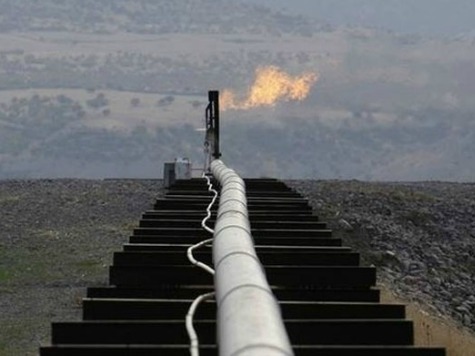
The terrorist group Islamic State, formerly the Islamic State of Iraq and al-Sham (ISIS), could be making up to $3 million a day in illicit oil sales using captured oil fields in Iraq and Syria. Iraqi officials are warning that the jihadists are selling their own oil in ISIS-controlled areas and shipping it out to shady buyers in nearby countries.
According to NBC, the Islamic State – which is attempting to transition from terrorist group to, precisely, a state – has begun to sell gas from oil fields and wells it has acquired at gas stations in Mosul, the second-largest city in Iraq and ISIS’s de facto capital in Iraq (the capital of the Islamic State is officially Raqqa, Syria). It is also said to be selling oil barrels to black market traders in Turkey at $25 per barrel.
Supporters of the Islamic State have been publishing photos on Twitter of what they allege are mass distributions of gasoline to people in Raqqa and Mosul, as an attempt to provide as a government to the conquered:
‘ ‘ Distribution of gasoline to the people of the city ‘ ‘#ISIS #ISLAMICSTATE #IS #DAWLAH#SYRIA #IRAQ pic.twitter.com/k2EJlEguYs
— Abo Islam Al-Ansari (@Raptull1311) July 28, 2014
NBC notes that about 80 wells captured in Iraq by ISIS are not pumping, but this issue does not appear to be a problem yet in the oil fields captured in Syria. According to Foreign Policy, which estimates that ISIS is making up to $3 million a day in revenue on oil alone, illicit production of oil in both Iraq and Syria, by ISIS as well as other jihadist groups, is up to 80,000 barrels a day. In Syria, 60% of oil fields are controlled by jihadists or tribesman, not the government of President Bashar al-Assad.
While the numbers are alarming, its oil production may not be enough to sustain the Islamic State. As the jihadist group attempts to expand from being a rogue collective of international mujahideen to a government, it will need to pay salaries and offer public services and social programs. This is especially true of a socialist experiment like the Islamic State, which has indicated a high interest in providing for social welfare and limiting private enterprise. As one expert tells Foreign Policy, ISIS has “gone from being the world’s richest terrorist organization to the world’s poorest state.”
The revenue from oil sales has triggered enough interest in the United Nations that sanctions may be forthcoming for those who do business with the state, however. On Monday, the UN Security Council issued a statement condemning “any engagement in direct or indirect trade of oil from Syria and Iraq involving terrorist groups” and defining such business as “financial support for terrorists and may lead to further sanctions listings.” That statement was, however, drafted by Russia, which has its own reasons to make sales from the Islamic State difficult: an unsavory reputation of its own that has led to sanctions on its own oil sales from the European Union and the United States.

COMMENTS
Please let us know if you're having issues with commenting.